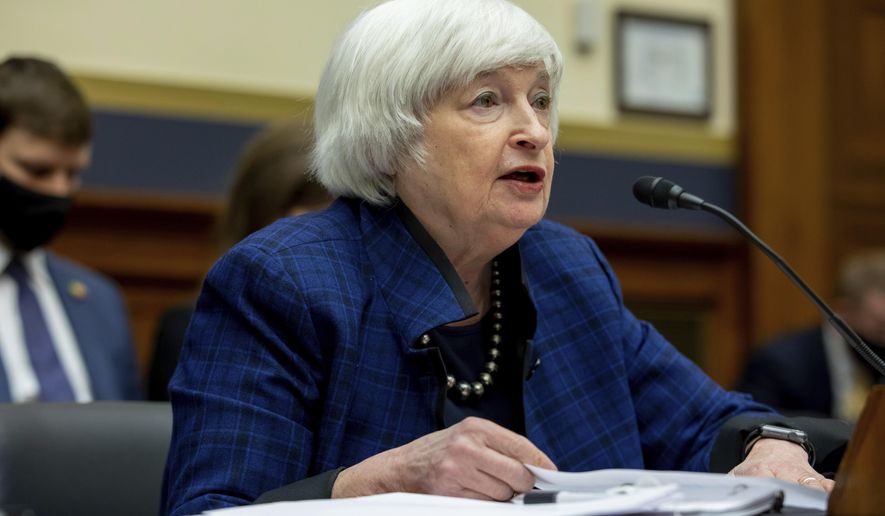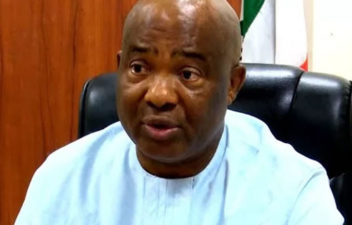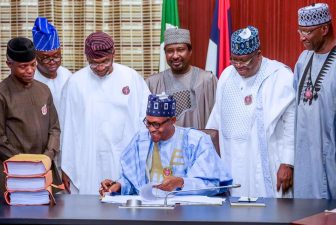Recession fears are beginning to spike across Washington and Wall Street, complicating President Biden’s agenda heading into the midterm elections.
Economists say the Federal Reserve System’s efforts to lower soaring inflation by raising interest rates are likely to trigger a recession in the coming months. They note that the economy, wracked by supply-chain issues and an overgenerous COVID-19 relief package, appears primed to enter a tailspin as interest rates jump.
“Most signs that count are pointing to a recession,” said Carl Schramm, an economics professor at Syracuse University.
Some of the world’s leading financial institutions are issuing a similar warning. Deutsche Bank economists issued a report Tuesday forecasting a recession starting next year that will see U.S. unemployment rise to at least 5%, from 3.6% in March.
Meanwhile, Treasury Secretary Janet Yellen warned a House panel Wednesday that Russia’s invasion will have “enormous economic repercussions in Ukraine and beyond.” She added that the rising price of energy, metal, wheat and corn that Russia and Ukraine produce “is going to escalate inflationary pressures as well.”
The warnings do not bode well for Mr. Biden and Democrats, who retain narrow control of Congress. Heading into November’s midterms, the White House is pushing an ambitious agenda, including tax increases and trillions of dollars in new social welfare and climate change spending.
“Progressives understand that our mandate in this governing moment is to deliver for working people and to leave no one behind,” said Rep. Pramila Jayapal, Washington Democrat. “To that end, we have been pursuing a strong legislative strategy, and we will continue to do that.”
Behind the scenes, however, Democrats concede that any major spending initiative will find a difficult audience in the 50-50 Senate as recession fears mount.
Leading moderate Democrats, notably Sen. Joe Manchin III of West Virginia, have expressed frustration with the size and scale of the White House’s ambitions.
“I’ve never found out that you can lower costs by spending more,” Mr. Manchin said.
Given universal Republican opposition, Mr. Biden’s agenda can move only through budget reconciliation, a process that lets some spending and tax measures avert the Senate’s 60-vote filibuster threshold and pass with a simple majority.
Without Mr. Manchin’s support, that path appears blocked.
Some Democrats say, though, that Mr. Biden’s agenda is going to change anyway as more signs of a recession become evident.
“It’s hard to sell to someone on spending $500 billion to tackle climate change when people are losing their jobs,” said one senior Democratic aide who was granted anonymity to speak frankly.
“A recession scrambles the political math, it forces difficult decisions — like whether you have to cut money for electric vehicle infrastructure to shore up unemployment insurance,” the aide said.
Apart from legislative issues, fears of a looming recession are also likely to damage Democrats heading into the midterms. Democrats were already expected to lose seats, as historically the incumbent president’s party does poorly in the first midterm.
“People are always going to look for someone to blame for these kinds of economic issues,” said J. Miles Coleman, an elections analyst at the University of Virginia’s Center for Politics. “That happens to be the Democrats because they are in power now.”
The reality is one that Democrats cannot escape. Economists note that if the Federal Reserve does not move to squash inflation, which is at a 40-year high, it likely will result in a larger recession down the line. But the very same tools needed to counter inflation, such as raising interest rates to tighten the money supply, are also likely to create a recession, albeit a much smaller one.
“Over the past 75 years, every time inflation has exceeded 4% and unemployment has been below 5%, the U.S. economy has gone into recession within two years,” former Treasury Secretary Larry Summers warned in a recent Washington Post op-ed. “Today, inflation is north of 6% and unemployment is south of 4%.”
As inflation has soared over the past year, Republicans contend that Mr. Biden’s policies are to blame. They say the White House’s $1.9 trillion coronavirus relief package, signed into law in 2021, flooded the economy with excess money at a time when the nation was facing a supply chain crisis.
“Democrats didn’t listen. They pushed ahead,” said Senate Minority Leader Mitch McConnell, Kentucky Republican. “For 12 months and counting, working families have been paying a heavy price.”
Democrats disagree that Mr. Biden’s massive coronavirus relief bill is the culprit. Instead, they say that Russia’s invasion of Ukraine upended the global economy, which, coupled with supply chain issues and corporate greed, has created the perfect storm.
“Globally, spillovers from the crisis are heightening economic vulnerabilities in many countries that are already facing higher debt burdens and limited policy options as they recover from COVID-19,” Ms. Yellen told lawmakers.
Source: The Washington Times




